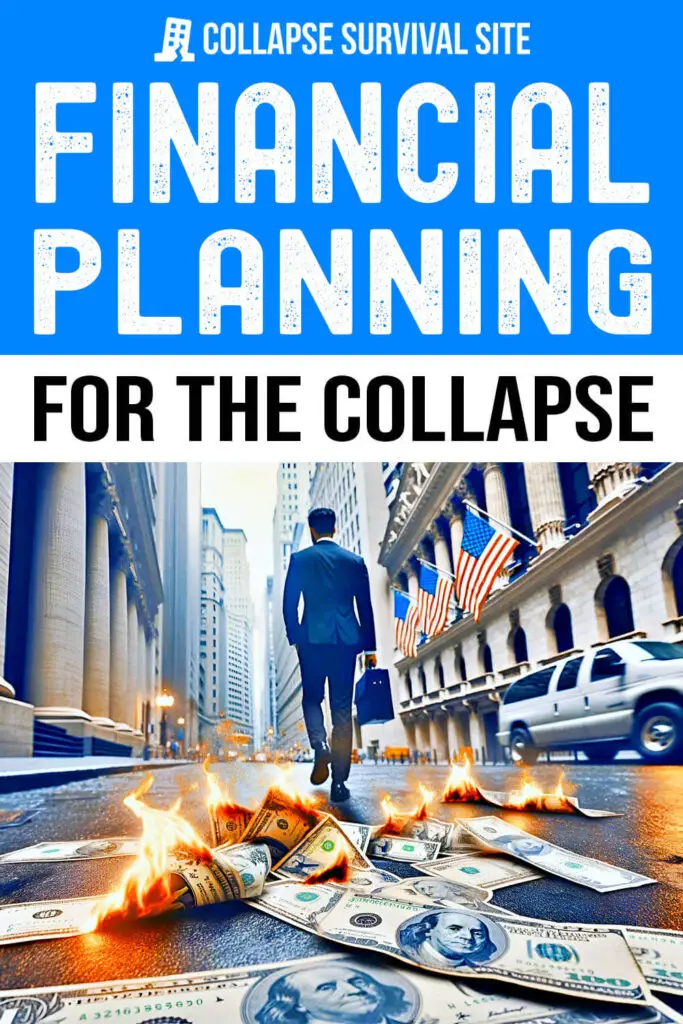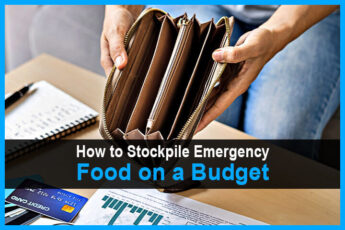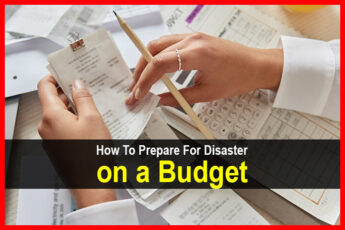Estimated reading time: 11 minutes
When it comes to planning for a total financial collapse it’s a good bet that you can throw the conventional financial advice out the window.
Most of the data on surviving a financial collapse is based on the Great Depression back in the 1930’s and some significant financial events that have occurred since including 1970’s stagflation, the 1981 recession, the 1989 Savings and Loan Crisis, the 2008 great recession, and the ongoing impacts of the COVID pandemic.
Want to save this post for later? Click Here to Pin It On Pinterest!
Lessons Learned?
Somehow, and in spite of continuing failures of decision making and policies, economic calamities continue to occur always relying on government bailouts funded by everyday taxpayers.
In the meantime, financial advisers glibly recommend the same boilerplate advice for surviving economic “downturns.”
What’s alarming are the events affecting global markets and global economies right now. The U.S. seems to be in somewhat of a recovery as inflation has moderated a bit, but based on a recent verdict in Washington State where the chicken and tuna industry monopoly was found guilty of price fixing, corporate greed still rules the lives and the budgets of everyday people.
The End of Globalization
Yogi Berra said it best, “The world is getting more global.” But what makes all economies more vulnerable in today’s environment is the economic interdependence of countries around the world. The world marketplace drives the economies of many countries as they export their available resources and manufactured goods, and import needed resources and products in return.
It works assuming that everything runs smoothly if not perfectly, but a threat has emerged to global commerce: the “Polycrisis.” It’s a compound failure of multiple critical systems leading to energy and food supply crises; rising inflation, cyberattacks, failure to meet net-zero targets, weaponization of economic policy, and the weakening of human rights. And in the midst of the polycrisis, a new threat has emerged.
The AI Factor
Artificial intelligence or “AI” continues to show up as a new promise and a new threat. The most immediate threat is to jobs that were traditionally fulfilled by clerical workers. As AI grows and improves, more and more jobs will be displaced not only by the continuing robotic automation of manufacturing tasks, but more clerical and intellectual tasks from accounting to creative fields and many other jobs traditionally performed at a desk.
The potential job loss as a result of failing economies and the emergence of AI is staggering and it won’t take a depression to put more and more people out of work. And as for commercial real-estate – kiss it goodbye as more and more people continue to work from home, and the sea of cubicles in office buildings are replaced by AI with one computer in a cubicle.
Eventual Economic Recovery is Always the Big “IF”
In spite of the continuing crises that plague economies there’s always the assumption that things will get better. Even the great depression finally ended although it took a decade and World War II to do it. But the assumption of recovery may not happen next time.
The combination of a global marketplace; the emerging polycrisis, a recently noted decline in population, and AI permanently displacing jobs could simply mean the end of the economic model as we know it. As a result, a wise approach to financial planning for the collapse may best be done across 3 stages of collapse.
3 Stages of Preparation for Financial Collapse
We need to think beyond the usual economic downturns we’ve seen in the past and think about the possibility of total, global economic collapse. It’s never happened before in modern times but the fragile complexity of modern economics make it a distinct possibility. That requires a new set of planning steps across a continuing collapse.
1. Recession
Many of us have been here before. It’s the standard set of recommendations for a recession. These are the common factors that occur and the investments that are most often affected.
- Job loss resulting in loss of income making it increasingly difficult to pay down debt while incurring more debt.
- Market failure of commercial real-estate. This is happening today as more and more people continue to work from home leaving many office buildings empty and un-leased.
- Failure of stocks related to non-essential goods and services and even basic and most luxury items most people can’t afford.
- Currencies as inflation continues to erode the value of money.
The Best Financial Preparations for Recession
This gets back to some of the standard recommendations that always assumed an economic recovery. They’re still wise moves but only a first step.
- Reduce debt as much as possible. This means reducing spending and paying down credit cards and other debt beyond major loans like a mortgage or vehicle. Most people can’t pay off their mortgage or auto loans but any other debt should be reduced as much as possible.
- Sell off any stocks in non-core industries. These are the highly speculative stocks, or stocks in vulnerable industries like luxury products or other discretionary purchases that people will find harder and harder to afford.
- If you choose to remain in the stock market, invest in core industries like healthcare, utilities and consumer goods. Regardless of an economic recession, people will still get sick, need electricity and food and clothing.
- Shift any real estate investments into homes or lots. Get out of those REIT’s (Real-Estate Investment Trust) that are often heavily invested in commercial real-estate.
- Start investing in precious metals either as physical gold and silver or sector mutual funds invested in mining operations.
- Invest in high-dividend yielding stocks. These also tend to be utility stocks and some consumer goods in addition to energy companies. They’re still safe sectors for investment and pay a high dividend.
- Get out of corporate bonds and into government bonds that are relatively more secure.
- Start thinking about new skills you could acquire or master to generate income on the side or in case you lose your current job.
- Develop a plan and behaviors that allow for strict budgeting. Now’s not the time to buy luxury items, new cars or a lot of new furniture. Make do and try to spend less.
How many of these things anybody can do depends on their financial condition, but most are standard recommendations from financial planners. What financial planners don’t seem to recommend occurs in the next category.
2. Economic Depression
Any Internet search for how to survive an economic depression usually defaults to the word “recession.” For some reason financial companies simply don’t seem to want to admit that another depression would be possible. Here’s what could happen and thoughts on what to do.
- From inflation to deflation. The value of a currency starts to become less and less as inflation makes everything more expensive and deflation reduces the buying power of currency.
- Massive job loss and reduced wages are another fact of any depression. It’s not only about losing a job, but even people who are still employed see a reduction in wages and overall compensation. Companies become indifferent in an economy when so many people are out of work, and simply say that to stay in business wages must be cut.
- The supply chain collapse spreads and becomes a thing of the past. Especially the just-in-time manufacturing processes that allowed companies to avoid the costs of storing excess inventories. The result is a shortage of many common products and empty store shelves.
- The collapse of the Real Estate market goes beyond commercial real estate to all properties. People abandon homes that are worth far less than the mortgages they can hardly afford and widespread foreclosures become common.
- Bank failures begin to occur with increasing frequency. The government again tries to salvage many of them but a form of economic triage emerges with only the most critical banking institutions being preserved and supported.
- Growing civil unrest emerges as both crime and violence begin to emerge in a desperate and enraged public.
The Best Financial Preparations for an Economic Depression
There are still some traditional recommendations that show up for preparing for an economic depression in addition to non-traditional recommendations. To some degree these moves still assume an eventual recovery.
- Government bonds become the only reliable bond investment although their rates are subject to the strain the government is enduring as they continue to salvage a failing banking industry.
- Fixed Income bonds are another possibility that offers a guarantee of a fixed and steady stream of interest either from the government or corporations.
- Precious metals continue to show up but their cost during a depression will increase significantly. One possibility is to look at traditional coinage minted in or before 1964.
Most have varying degrees of silver content with increasing bullion value simply because of the silver they contain. Jewelry is another source of precious metal that should be located and isolated for potential sale.
- Cash is not as simple or obvious as it sounds. As banks fail it can be harder and harder to withdraw significant amounts of cash, but as the value of currencies decline the cash under the mattress will be worth less and less.
- Entrepreneurship will emerge as the new source of income as people continue to hone and expand their skills to a gig economy where they either find side jobs that require a unique skill set, or sell home manufactured goods.
- If possible, an investment in a property that is in a rural location may be a wise step and prep for what could be a continuing economic spiral. Property values will be in a steep decline and if someone has the cash on hand or can manage to get a loan, a rural or wilderness property could be a lifeboat to a new lifestyle necessary for the final stage of economic collapse.
3. Global Economic Collapse
The collapse of the global economy is not only a possibility but it appears to be happening as more and more countries and societies continue to fail. Here are some of the current results and more to come.
- Worldwide Inflation/Deflation/Hyperinflation devastates currencies and the ability to engage in basic commerce and buy goods.
- Global stock and bond markets collapse as corporations go bankrupt and even governments begin to struggle to maintain interest payments on things as simple as bonds.
- The global supply chain ceases to exist and only the most precious commodities like oil and grain still manage to dock in an occasional port.
- Collapse of the banking system spreads and a new and precarious federal bank emerges.
- Growing civil unrest and civil wars begin to take countries beyond economic collapse to the total collapse of their societies.
- Interstate wars occur with greater frequency.
- Total economic disparity (0.1% versus 99.9%) as a small fraction of society still manages to protect their wealth and status much like the societies defined by the middle ages.
The Best Financial Preparations for Global Economic Collapse
There’s no modern precedent for a total collapse of a global economy. One thing that seems inevitable is chaos as civil unrest turns to civil war in many nations and in some instances, interstate wars as countries find new and desperate reasons to invade and attack neighboring countries and perceived rivals.
Financial planning may be a thing of the past but new and smaller economies will continue as long as people continue to eat, wear clothing and require medical attention. What will obviously emerge is a new lifestyle and a new and sometimes old set of commodities will emerge as the new currency driving local economies.
- Precious metals will continue to have value and old coinage with silver content may become the only currency with accepted value in everyday purchases. The days of credit cards and ATM’s will either be long gone or highly questionable and a barter economy will emerge as the new standard for trade.
- Assembling, creating or stockpiling key goods for barter will become a reliable source of currency including homegrown and canned foods, medical supplies and medicines, and basic commodities like handmade furniture, clothing, boots and other basic necessities.
- The development of barter skills will emerge with new value especially construction and repair skills as the ability to fix anything will be the only way to keep things going.
- Rural and wilderness real estate will soar in value as many people return to pioneer lifestyles self-supported by their ability to live with and off the land.
- Stockpiling for sustainability will be the new normal and hoarding will be commonplace as new and rare products show up from time to time.
- Homesteading as a new lifestyle will emerge as even people in cities and suburbs learn new skills to make what they need and repair what they can.
Can It Happen?
Based on what we’ve covered, it already happening. Given this progression of events to a radical shift in lifestyle, it may be wise to look past the conventional wisdom for surviving those economic “downturns,” and think about where this all may end.
That may be a good enough reason to think about buying some rural land; learning how to build your own home or cabin, acquire new skills, stockpile for a future without most stores, and think about all the ways to live sustainably. And while you’re at it, maybe now’s a good time to start collecting some of those old silver coins minted before 1964.
Like this post? Don't Forget to Pin It On Pinterest!








